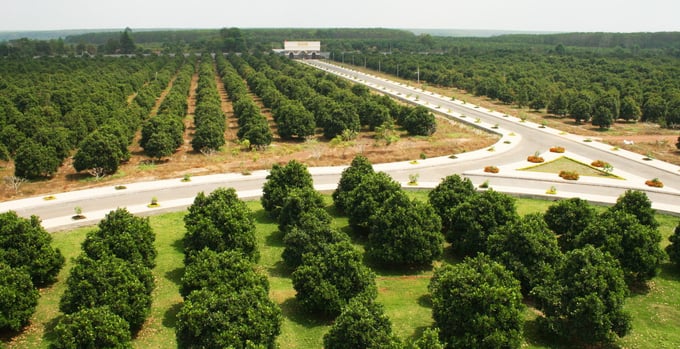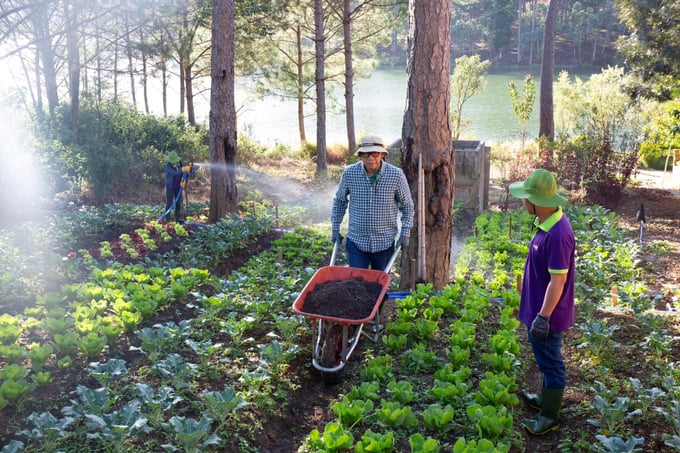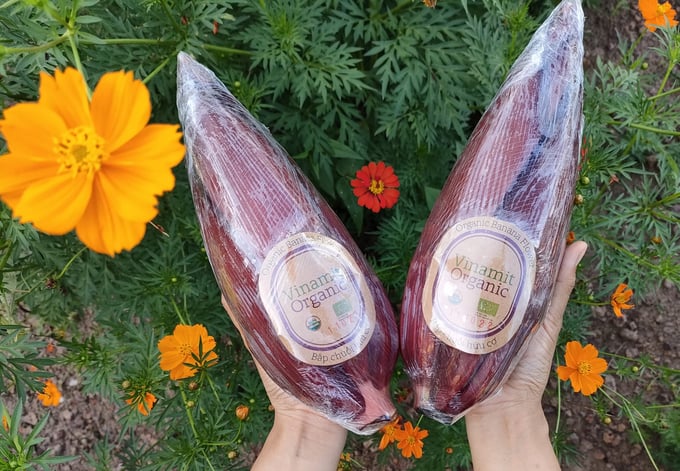May 20, 2025 | 16:50 GMT +7
May 20, 2025 | 16:50 GMT +7
Hotline: 0913.378.918
May 20, 2025 | 16:50 GMT +7
Hotline: 0913.378.918

A corner of Vinami Organic's organic agricultural production farm.
Organic agriculture production is the inevitable trend that Vietnam and the world are moving toward.
Vietnam's agriculture industry has gradually bolstered the development of organic agriculture, viewing it as a sustainable way to address certain deficiencies, such as quality standards and production processes, in preparation for a time when our agricultural products will be able to capitalize on large potential markets.
Organic agriculture production is based on the principles outlined by The International Federation of Organic Agricultural Movements (IFOAM) so that the ecosystem of plants and livestock may produce safe goods for customers, deliver high economic efficiency, and increase the fertility of the soil.
Organic agricultural production is the process of organic livestock production, organic vegetable and fruit cultivation, and organic food production without the use of hazardous chemicals such as pesticides, plant protection agents, herbicides, and fertilizers.
The principles of organic agriculture are the fundamental roots from which it may develop and serve as the most diversified driving force for the organic movement.
Currently, organic agriculture is based on four fundamental principles: health, ecology, fairness, and care.
With these four principles, the apparently simple adoption of organic agriculture in practice is in fact complicated and takes a systematic investment, determination, and expertise to apply the four principles listed above.
However, when Vinamit Organic has performed effectively in organic agriculture, it becomes apparent that organic agriculture is not a difficult task for the company. Vinamit Organic is currently in the process of transitioning to a new phase, the phase of sustainable development of high-tech organic agriculture for life.
In Vietnam, organic agricultural production has difficulties in terms of producer income, the complexity of the production process and monitoring, and the fragmentation of production costs.
Due to the unproven income attractiveness of organic agriculture, the majority of farmers do not intend to convert, as the first investment is quite high and the consumer market is not committed to ensuring production continuity.
The output of organic agriculture must also be addressed carefully. Organic agriculture production size is low, yet it is still challenging to locate the output market.
Consequently, there is significant potential and opportunity for the growth of organic agriculture in Vietnam. However, obstacles and hurdles are evident. To transform obstacles into potentials and challenges into opportunities, one must make a deliberate investment from the outset and engage in continual development during the course of one's life and growth.

Mr. Nguyen Lam Vien, General Director of Vinamit Joint Stock Company (plaid shirt) visited the garden with technicians in the organic agricultural production area.
Mr. Nguyen Lam Vien, the general director of Vinamit JSC, stated that Vinamit Organic has begun promoting organic agriculture. The brand was formed over a lengthy time period.
"During this 'pregnant' time, Vinamit Organic's employees were required to work that exceeded biological boundaries. The hardships endured by pioneers can easily discourage individuals. "However, Vinamit Organic has conquered this pregnant period via the combined efforts of all of its employees," added Mr. Vien.
Vietnam's lack of information regarding organic farming techniques was the first obstacle Vinamit Organic experienced. Vinamit's General Director explained that this was the reason why Vinamit Organic began with organic standards of the United States Department of Agriculture (USDA) and organic requirements of the European Union.
The second challenge faced by Vinamit Organic is the issue of soil and water required for agriculture. Vietnamese agriculture has a problem in meeting the stringent USDA and EU organic standards.
The following obstacle was the lack of staff, an expert team, and a technological team. "Finding specialists and technicians was like looking for a needle in a haystack," Nguyen Lam Vien recounted.
In addition, Vinamit Organic confronted a number of obstacles in the early stages, including investment costs, markets, consumer awareness, legislation, supporting industries, varietals, climate-soil conditions, and the difficulties of the "lone ranger," who is considered the pioneer.

One of many organic agricultural products of Vinamit Organic.
Mr. Nguyen Lam Vien stated, "We feel that all organic agriculture groups and individuals must face these challenges."
According to Mr. Vien, certain obstacles have been eliminated, and the state's organic agricultural laws have helped the promotion and support of organic farmers. Vietnam has gathered experience in the development of organic agriculture in a favorable direction and is improving as a result of its development process, which has resulted in several benefits for organic farming.
In the early phases of the development of organic agriculture, Vinamit Organic had several benefits and chances.
Moreover, society's opinion of organic agriculture is always evolving. The perseverance of Vinamit Organic has awoken informed customers. Although Vinamit Organic's goods lack certification, consumers have welcomed them.
Evidently, advantages are always accompanied by challenges, and challenges are always accompanied by advantages. It is essential to transform obstacles into actions in order to obtain positive outcomes.
Mr. Vien and Vinamit Organic anticipate that when its goods are marketed abroad, people would refer to Vinamit organic as a national brand of Vietnam's organic agriculture.
Translated by Linh Linh

(VAN) Khanh Hoa is investing over 545 billion VND to develop 240 hectares of high-tech marine aquaculture in order to guarantee a consistent supply of seafood exports and achieve the USD 1 billion target.

(VAN) Minister of Agriculture and Environment Do Duc Duy held a meeting with Soopakij Chearavanont, Chairman of C.P. Group, on May 15.
/2025/05/16/3800-0-nongnghiep-143756.jpg)
(VAN) Suntory PepsiCo Vietnam coordinated with the Ministry of Education and Training to implement an education program on water conservation, reaching nearly 1 million primary school students nationwide.

(VAN) Vietnam’s TH Group officially put its high-tech fresh milk processing plant into operation in the Russian Federation, marking a historic moment as the first TH true MILK cartons were produced in Russia.

(VAN) Use of high-quality broodstock and biotechnology is regarded as the most effective approach to ensuring sustainable and economically viable shrimp aquaculture ahead of climate change and the emergence of increasingly intricate disease patterns.

(VAN) Carbon farming is a form of agricultural practices that helps absorb more greenhouse gases than it emits, through smart management of soil, crops, and livestock.

(VAN) This is a key content of the Memorandum of Understanding recently signed between the Vietnam Fisheries Society and Kunihiro Inc of Japan.